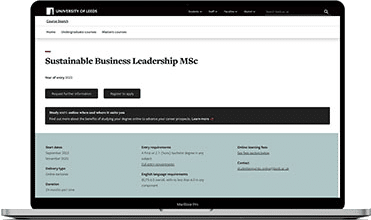Why Businesses Need More Sustainable Management
Sustainable Business Leadership
As we move further into the year, organisations are continuing to implement sustainable management practices off the back of legislative changes and global agendas such as the United Nations Sustainable Development Goals (SDGs).
To identify how businesses can contribute to these goals, we assess what sustainable management is, it’s importance and some of the key individuals making a difference to the world.
Learn more about our Sustainable Business Leadership courseWhat is sustainability management?
Sustainability management is a term used to define the managerial decisions that business individuals or a group of business individuals make and the tactics they implement to change or improve the social, economic or environmental impact of an organisation. This typically involves planning for sustainability changes and considering the business impact of such decisions. Whilst it’s important for businesses to make a change for the better, they’ll also be looking to balance this with a favourable financial return and enhanced reputation.
The importance of sustainability management
Businesses need more leaders driving sustainability management to change the world. For organisations, this is also crucial for them to meet legislative criteria, sustainability targets, and corporate social responsibility goals.
For example, the United Nations SDGs are designed to create a “blueprint to achieve a better and more sustainable future for all” through ambitious targets including:
- Climate action – To take urgent action to combat climate change and its impacts.
- Gender equality – To achieve gender equality and empower all women and girls.
- Decent work and economic growth – To promote sustained, inclusive and sustainable economic growth, full and productive employment and decent work for all.
How sustainability management can tackle global challenges
In order to meet some of the targets just mentioned, businesses will need to devise sustainable management practices to solve some of the most pressing sustainability issues.
1. Climate change
As the world continues to experience record-breaking greenhouse gas concentrations, rising sea levels and increased temperatures, it’s clear that climate change is a huge risk to the future of our world. Sustainable management can play a crucial role in slowing down the devastating impact of climate change.
2. Driving equal opportunities
As of March 2023, there are soon to be only eight black CEOs in Fortune 500 companies, and this lack of representation clearly demonstrates an unjust situation for aspiring black professionals looking to progress their careers and access leadership roles. This lack of equal opportunity can even affect people by gender, class, disability, and sexuality, making sustainable management crucial to combat this injustice and generate equality in the workplace.
3. Providing decent work
According to Statista, about 220 million people worldwide are out of work. This level of unemployment is down to several reasons including but not limited to poor education and training, health, and poverty. Sustainable management practices can help overcome this challenge and contribute to fairer work opportunities.
How sustainability management can impact an organisation’s bottom line
Whilst businesses need to meet sustainability objectives their operations also need to remain commercially viable. They can take steps to benefit their bottom line by:
1. Reducing running costs
Typically, most of the benefits from investing in environmentally friendly technologies and initiatives will be experienced in the long-term. For example, eBay switching to renewable energy sources to power their office headquarters will have been a big initial investment to set up but will reduce running costs in the long-term and help minimise their carbon footprint.
2. Enhanced productivity
By investing in equal opportunity initiatives, businesses will benefit from improved employee satisfaction which will also have a positive knock-on effect on productivity and potentially an organisations bottom line. In 2018, a study from McKinsey found that having diverse gender mix in managerial positions increased productivity with the most diverse companies 33% more likely to outperform less diverse companies on profitability.
3. Increased employee retention
According to Glassdoor, the average cost of recruiting a new employee in the UK is £3,000. By offering equal opportunities and positive working conditions, businesses can benefit from increased employee retention, reduced hiring costs and improved productivity.
Examples of sustainability management in action
1. Jennifer Morgan
Jennifer Morgan is the Executive Director for leading climate change organisation, Greenpeace. With over 27 years in the industry, she has been a pioneer for climate change, working for a range of world-changing firms including WWF (World Wildlife Fund) and the World Resources Institute. She was a Review Editor for the Intergovernmental Panel on Climate Change’s 5th Assessment Report and is a leading voice in climate change and sustainability, recognised by political standards organisation apolitical as one of the world’s top 20 most influential people in climate policy.
2. Rachel Cargle
Rachel Cargle is the Founder and President of The Loveland Foundation. In 2018, she made a birthday wish for black women and girls in the US to receive free therapy support and created a fundraising page to raise support funds. The campaign was quickly noticed by a large community of social media followers, raising $250,000. Following this her non-profit organisation was founded, providing free therapy sessions and scholarships for those interested in working in mental health. Her inspirational work strives to drive sustainable change against racial injustice and support future generations of underrepresented communities for years to come.
3. Kevin Frey
Kevin Frey is the CEO of Generation Unlimited. In 2003, he founded his first company TeachAway which has developed into one of the world’s leading international job-matching platform for teachers. In his current company, Kevin drives sustainable management practices for a digital education platform who have partnered with Accenture, Dubai Cares, Microsoft, and UNICEF to provide free, quality, digital education for young and disadvantaged people. Kevin is a key sustainable leader helping prepare the next generation with the skills needed to succeed in the workplace.
Why study the Sustainable Business Leadership MSc online at the University of Leeds?
The Sustainable Business Leadership Masters / Postgraduate Certificate (PGCert) at the University of Leeds is delivered 100% online, giving you the flexibility to learn whilst working. If you are highly driven to transition to a more sustainable economy and asserting the implementation and management of sustainable strategies in your organisation, this online Sustainable Business Leadership course will give you the forward-thinking knowledge to take your career to the next level. You’ll learn more about sustainable management and plenty of other topics through our range of modules led by expert academics.

Did you enjoy this blog? Here’s some related sustainability content that you may be interested in:

Want to learn more about our online Sustainable Business Leadership course?
Check out the course content and how to apply.

